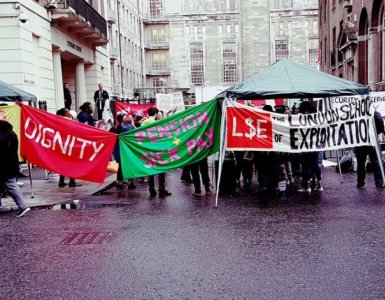Minefield is an odd beast. Moving yet frustrating, what it lacks in polish it more than makes up for in sheer heart.
It’s hardly even a play at all. The piece, by Argentine writer and performer Lola Arias, sees six real-life veterans talking through their stories on stage. Sourced through rehearsals in Buenos Aries, we see two Brits, 3 Argentines and a Ghurka work perform experiences that are at times painful, but always true.
English and Spanish subtitles help make clear from the outset that this play is dedicated to, even obsessed with, dialogue. Every moment of Minefield is riddled with a hunger to come face to face with the ‘enemy’, finally, after all these years, and talk things through. This is true even when, as is admitted at the very beginning, these performers don’t understand a word each other is saying. Their stories are rough, and right until the end there is no sense of compromise. Each side sticks to their guns, and refuses to cede the argument. But still there’s room for compassion.
Practically, the play is about as DIY as you can get. All we have for set design is a white backdrop, a video camera, a projector and an occasional drum kit. All this is emblematic of a piece of theatre that deals in real life.
Archive footage and recordings of Thatcher and Galtieri make this a play that revels in history, but makes that history about the personal stories of those who lived it, not the powers that declared war. Analysis of Thatcher and Galtieri themselves is light and almost entirely comical. You can feel the contempt for leaders resonating through the years, and its by no means unjustified.
This is not just run of the mill political history however. The presence of Sukrim Rai, a Gurkha fighting for the British, shows us that we are talking about a piece of history that has almost been forgotten. Brushed aside as Thatcherism leaps into its stride in 1982, the Falklands/Malvinas War might well be easily forgotten.
Yet at times the play feels like it is just skimming the surface. It deals in emotions, but never really interrogates them. Despite the threads of anger, frustration and betrayal running through the play, we never really get to look down the rabbit hole. Perhaps that’s a virtue in itself. There is still compassion, despite the refusal to back down. A nice resolution, where everybody agrees to disagree, would be too easy.
Instead, seen each other face to face, they look away. This seems to say something about the nature of grief, and the legacy of war. In the end, this is just a group of people talking through their problems, as best they can.
In the end, perhaps that is all we have.



Add comment